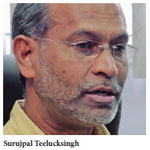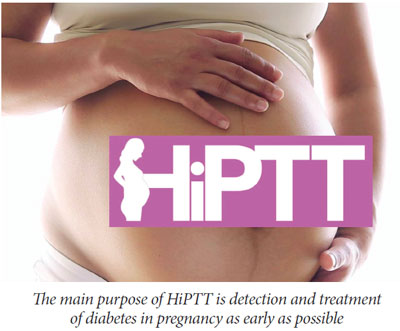
 “If there is a problem it is better to go to the source,” said Surujpal Teelucksingh, Professor of Medicine at UWI St Augustine’s Faculty of Medical Sciences. “If there is a problem it is better to go to the source,” said Surujpal Teelucksingh, Professor of Medicine at UWI St Augustine’s Faculty of Medical Sciences.
The problem in this instance is diabetes. In fact the “problem,” he and several other speakers repeatedly made clear, is an understatement. In Trinidad and Tobago diabetes has become an epidemic. In the space of three decades it has become the second highest cause of death in the nation.
And the “source” that Teelucksingh is referring to is even more concerning. The source is the womb. Professor Teelucksingh, speaking before an impressive audience of government officials, technologists, medical practitioners, humanitarians and UWI students and staff, had not come to focus on the problem. This was an event about solutions. The gathering was for the unveiling of an innovative and promising answer to the dangers of diabetes in pregnant women.
In October the Helen Bhagwansingh Diabetes Education Research Prevention Institute (DERPI) launched the Do Campaign at the Port of Spain headquarters of Microsoft. The campaign is a sweeping initiative that brings together a host of stakeholders to develop the mechanisms for diabetes screening in pregnancy. A key aspect of the Do Campaign is Health in Pregnancy Trinidad and Tobago or “HiPTT”, a mobile application that connects patients, doctors, laboratories and health institutions.
The main purpose of HiPTT is detection and treatment of diabetes in pregnancy as early as possible: “We know that many women enter pregnancy with pre-existing diabetes. What’s worse, more are going to develop diabetes during pregnancy. And guess what? We are not going to recognise this disease until it is too late,” says Professor Teelucksingh.
HiPTT changes how detection takes place, moving from the conventional “linear” model of steps towards a circular model in which all parties are connected simultaneously – patient, doctor, laboratory, and health institution. The app was developed and tested by a team of lectures from The UWI Department of Clinical Medical Sciences and the Faculty of Engineering, members of DERPI and the CARIRI Microsoft Innovation Centre.
For more information on HiPTT read: https://sta.uwi.edu/uwitoday/archive/october_2015/article4.asp
STRONG ADVOCATES FOR PREVENTION
From the groundwork laid in the development of HiPTT, the Do Campaign is now taking these innovations in early detection to the national audience. The attendees at the launch ceremony included senior representatives of the Trinidad and Tobago Ministry of Health, PAHO/WHO, the Trinidad and Tobago Medical Association (TTMA), the Gynaecological and Obstetrical Society of Trinidad and Tobago (GOSTT), the Rotary Club of St Augustine, CARIRI, the National Gas Company of Trinidad and Tobago (NGC) and Microsoft.
“The Do Campaign is a combined effort of many organisations in this country,” said Frances Correia, Country Manager of Microsoft T&T. “This is a real problem in Trinidad that we have to solve ourselves. And there is a big part that technology can play in solving the problem. It took many people to collaborate on this and we are very proud.”
One of the most alarming aspects of the diabetes epidemic in Trinidad and Tobago is how rapidly it has grown, closely linked to the rise of obesity. A decade ago researchers found that 11% of school children were overweight, 2.5% of that total considered obese. Today the total figure of overweight children has risen to 33%, a300% increase.
 Research shows that out of 67,000 children, 13 were found to have Type 2 diabetes, “children with diabetes of the kind adults should be getting,” Professor Teelucksingh said. This compares to one in 67,000 Japanese children with diabetes and three in 67,000 Canadian children. Research shows that out of 67,000 children, 13 were found to have Type 2 diabetes, “children with diabetes of the kind adults should be getting,” Professor Teelucksingh said. This compares to one in 67,000 Japanese children with diabetes and three in 67,000 Canadian children.
“This is a major public health problem, not a clinical problem,” said Dr Rohit Doon, Adviser, Health Promotion Communications and Public Health with the Health Ministry.
Representing the Ministry of Health at the Do Campaign launch, Dr Doon called the diabetes problem “staggering” and “worrying,” and emphasised that the solution required the entire society – not just the medical sector – to come together to solve it.
Dr Doon applauded the broad-based nature of the Do Campaign and said it aligned with the Government’s strategy for addressing non-communicable diseases, which includes a loan from the IDB to fund a five- to six-year plan.
“This early intervention screening for diabetes is a significant and innovative approach that is welcomed and supported by the Ministry of Health,” he said, later adding, “be assured that the Ministry will stand ready to partner with you on the way forward.”
By raising awareness and funding, the Do Campaign can encourage more women and medical service providers to embrace the HiPTT app, which will increase the chances of early diabetes detection. This is an intervention that will not only improve the quality of lives. It will save lives.
Dr Stacey Chamely, President of the TTMA, said, “we wish to be strong advocates of prevention to decrease the burden and grief associated with the loss of mothers and their babies as a result of complications due to diabetes in pregnancy. We know that if even one child is saved due to screening, well, we have won, haven’t we?” |





